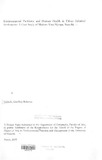| dc.description.abstract | Rapid urbanization especially in developing countries coupled with poor economic
performance has led to the proliferation of urban informal settlements which currently
house 850 million people or approximately one in seven people in the world. The disease
/ burden is high though not known with any degree of certainty. Methods for analyzing the
relationships are not fully developed, and the quality of available data generally poor (Briggs
et ai., 1996). This study aims at furthering knowledge on the interactions between the living
environment and quality of life in informal settlements. The study investigates and analyses
whether human health in informal settlements is significandy related to environmental
problems and whether households link incidence of diseases to their living environment.
The study also investigates whom the households think is responsible for the improvement
of their living environment.
The dependent variables considered are the following diseases: malaria or fever, diarrhoea,
cough and skin diseases. The independent variables (environmental status) considered
include: quality and quantity of water, sanitation facilities, cooking and lighting fuel, disposal
of household waste, housing conditions and ownership of household assets as a proxy of
socio-economic status. A sample of 200 households was chosen through multistage cluster
sampling and simple random sampling. The study used observational design employing both
interview and observation, to answer descriptive research questions. Linear probability
models to denote regressions were run to answer relationship research questions.
The study found that there is a significant relationship between environmental problems and
human health in informal settlements. Respondents were also able to link incidence of
diseases to environmental problems. However, respondents do not think that individual
households have a significant role in improving their environment; a role they think should
be taken by the government. The study recommends that although environmental awareness
in informal settlements is high, there is need to sensitize residents on ways in which
individual households can improve their living environment. Further research is required to
examine the contribution of work environment on health, whether environmental problems
affect all sectors of the population equally, and to quantify the contributions of specific
environmental problems to the disease burden | en |

